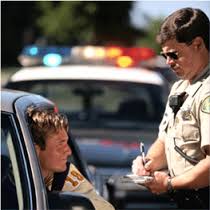We all know that sinking feeling when you get pulled over for a traffic violation. If you’re lucky, you might just get a “fix-it” ticket for a broken tail light. But what if it was a more serious offense, like speeding or reckless driving? Depending on your driving record, you could get slapped with a sizeable penalty or even a jail sentence – and your insurance rates will almost certainly go up.
Let’s say you absentmindedly ran through a stop sign or made an illegal left-hand turn. You’ll probably know right away how much the ticket will cost, but it could take months before your insurance company receives notice of the infraction and adjusts your premium.
If the suspense is killing you, Insurance.com has a handy tool called the “Uh-Oh! Calculator” that estimates the average rate increases for the 14 most common traffic violations. And, if you enter your age, ZIP code, residence type, marital status, length of time with your insurance carrier and current premium, the calculator will generate a more customized estimate based on your personal data.
Some of the average premium increases are pretty shocking:
* Reckless driving: 22 percent
* DUI first offense: 19 percent
* Driving without a license or permit: 18 percent
* Careless driving: 16 percent
* Speeding 30 mph over the limit: 15 percent
* Failure to stop: 15 percent
* Improper turn: 14 percent
* Improper passing: 14 percent
* Following too close/tailgating: 13 percent
* Speeding 15 to 29 mph over limit: 12 percent
* Speeding 1 to 14 mph over limit: 11 percent
* Failure to yield: 9 percent
If you plug in your personal data, the calculator will tell you how many points will be added to your driving record per infraction, as well as information on the state’s rules for when driving privileges can be suspended or revoked.
Another company, DMV.org, features a “Ticket Fines and Penalties” tool that provides an even more detailed state-by-state analysis of what various infractions can cost, procedures for paying – or challenging – your ticket, how points are calculated, how long it takes to clear infractions from your record, links to local traffic schools and much more.
So, assuming you’re not going to challenge the ticket in court, the damage has been done and your insurance rates will likely climb – what can you do to lower your premium? Here are a few tips:
* Investigate whether attending traffic school will erase the ticket from your record.
* When your policy is up for renewal, get rate quotes from at least three carriers. Talk to an insurance agent or use an online comparison site – just be aware that not every carrier participates in these sites and make sure you’re comparing apples to apples, since companies often package coverage differently.
* Another reason to comparison shop: Insurance companies calculate risk differently, so particular traffic infractions might trigger varying increases, depending on the carrier.
* Increasing your deductibles from $250 to $1,000 might lower your premium by 15 to 30 percent.
* Ask about discounts for things like low annual mileage, being over a certain age, good grades, vehicle safety features or buying your homeowners or renters insurance from the same company.
The best way to avoid traffic violation-related rate increases is to not break the law in the first place. But if that horse has already left the barn, arm yourself with information about coverage costs and how you might be able to lower your rates.





